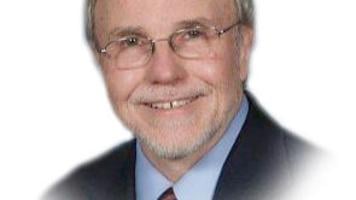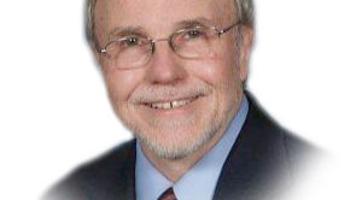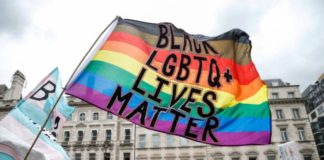
Something remarkable happened in my little corner of the world in Richland County. Our County Board of Supervisors passed a resolution celebrating LGBT Pride Month. It was not unanimous. There was respectful debate and a significant minority voted no. But even if the resolution had not passed, the mere fact that there was a public discussion would have been a victory.
There could have been no such discussion and certainly no resolution when I was in high school 53 years ago and my best friend was gay. Nor could it have happened a few years later when I was a student at Richland Campus and knew several gay students from Richland Center. Gay and trans people have always been a part of our families and communities and until recent years have not been free to be open about their sexual identity. This is an historic moment.
Supervisor Shaun Murphy-Lopez, who sponsored the resolution, commented after the meeting, “I was so impressed with Shawna Smith Kratochwill, the mother of an 18-year-old, who came to the meeting and gave tearful testimony about her daughter who was bullied after coming out in our community. The same was true for fellow County Board Supervisor Donald Seep from Cazenovia, who told a powerful story about his great-uncle who was forced to leave Richland County in the 1930s after it was discovered he was gay.”
My friend, Bill Joestgen, who was born across the street from where I was born in the little village of Loyd, writes, “I attended a Catholic grade school, grades 1-8, and was taught this same sort of rhetoric in our ‘Becoming A Person’ classes. We were taught that homosexuality was a mental illness and that all homosexuals had an agenda to turn young boys to be like them. One of the nuns, I think this was 7th grade, tied satanic possession in as a cause of being gay. It is no wonder I had no confidence or any feeling of self-worth until my 30s.”
My own United Methodist denomination has a similar history of denigration and non-inclusiveness. Thankfully this is beginning to change. More and more clergy and lay leaders are challenging their churches to open their hearts and doors to LGBT persons.
James Neal, a United Methodist clergy colleague, told about a surprise phone call last week, which he said, “was both incredibly sad and uplifting.”
“A young man tracked my number down and called to say he just moved to town. He was pushed out of his home and his family because he is gay. His parents had assured him he was going to hell because of his sexual orientation. He had all but given up on faith.”
Neal said that the young caller asked numerous questions about the passages in the Bible, the so called “clobber passages,” that he was told condemned homosexuality, “Do you really believe there are gay people in heaven? Do you think I can still go to heaven if I’m gay?”
Pastor Neal added, “Deep pain melted into an indescribable elation when I told him ‘absolutely, yes.’ God worked through him to hear and embrace those simple words, ‘absolutely, yes.’”
Scot Spencer, another U.M. colleague, wrote an open letter to the church, “Dear United Methodists: Here’s the bottom line. Do you really believe your grandchild who comes out to you as gay, or bisexual, or transgender, or queer is ‘incompatible with Jesus’ and will suffer an eternity of hell if they don’t remain single and celibate for the rest of their lives? Or, do you believe they are a person of sacred worth loved and affirmed by God and that God clearly knew all about them before you, or they, did, and if they find their true selves and a mate who loves them that God is not only okay with that but celebrates that…”
Spencer concludes, “What do you believe? And if you and your church aren’t talking about it, why?”
Rod Kennedy, Homiletics teacher at Palmer Theological Seminary, in Dayton, Ohio, and pastor of Emmanuel Frieden Federated Church, a congregation with both an American Baptist and a United Church of Christ heritage, preached a powerful sermon about fully accepting LGBT persons in the life of the church on “Pride Sunday,” June 20, “I speak directly to the power that has for centuries been arranged in ways that have been hurtful, harmful, and heinous for gays, lesbians, transgender, and bi-sexual persons… Lives have been wrecked; love has been denied; families have been fractured; denominations have been torn asunder all because some Christians read the book of Leviticus badly. The church has a history of using guilt and shame to badger, belittle, and control people. No understanding of the church is possible without an understanding of the dynamics of shame. One of the weapons of this hyper-masculine framing of faith has been the use of shame.”
Dr. Kennedy said, “Gays have been shamed with unrelenting force and devastating consequences. This power made gayness criminal and illegal. Then the ‘powers’ made it socially unacceptable and religiously a sin. Then the church insisted that gays could only be saved by total celibacy or by becoming straight through some sort of spiritual therapy. Then the ‘powers,’ under extreme pressure, granted gays some limited legal rights. Then civil unions were recognized. Finally, gay marriage became a reality. In the long struggle, the PCUSA, the UCC, the ELCA, and the Episcopal churches suffered painful splits… Today gay marriage is the law of the land. This doesn’t mean that the power opposing gay rights has surrendered or given up their war against gays. That is why we still have Pride Sunday as a rally point against the relentless campaign of the anti-gay groups that are mostly evangelical Christians, good church-going folk who want to overturn gay marriage and make America colder, more judgmental, more exclusive, and less diverse again.”
I am aware as I write these words that this is a topic that many people in our churches would rather not discuss. And I get that. We all have strong feelings about homosexuality. I grew up in a house where we did not talk about such things over Sunday dinner and the preacher never spoke about it in church. But we know better now. We know that lives are at stake. The Trevor Project reports that “…more than 1.8 million LGBTQ youth between the ages of 13 and 24 in the U.S. seriously consider suicide each year.”
Their survey, “…the largest of its kind, polled 40,000 LGBTQ people between ages 13 and 24 and found that 68 percent of the respondents reported symptoms of generalized anxiety disorder, 55 percent reported symptoms of major depressive disorder and 48 percent reported engaging in self-harm. In addition, 40 percent say they have “seriously considered” attempting suicide in the past year.” See nbcnews.com/feature/nbc-out/40-percent-lgbtq-youth-seriously-considered-suicide-past-year-survey-n1233832.
Every congregation has or has had LGBT children and youth. There are no exceptions. That they are suffering because of bullying and rejection is a fact. That their lives are at risk because of our stubborn refusal to hear their pleas is a hard truth. We can and we must do better. All of us, church families, pastors and Sunday school teachers have a responsibility to be advocates for LGBT youth in our communities.
For us in the church this means being willing to study the scriptures and learning how a few verses have been taken out of context and twisted to condemn as sin something that is a gift of God. Homosexual and trans persons have been present in every culture and every generation of humankind. It means challenging those church leaders in our communities who preach this hate, some of whom have actually called for LGBT persons to be killed. I suggest starting with a 16-minute video by Bishop Richard Wilke, the author of the popular “Disciple Bible Study” series. He tells about searching the scriptures after his 26-year-old daughter told him that she was gay. He addresses every Biblical verse that has been used by so called Biblical literalists to condemn LGBT persons. Watch it here, youtube.com/watch?v=0EOq-1uet_Y.
And speak regularly with youth in your family about the resources available.
Do not assume your child is not at risk. Tell them that if they ever need a non-judgmental person to talk to they can call the Trevor Lifeline at 1-866-488-7386. Talk to your pastor about these issues or call me at 414-339-0676.
John Sumwalt is a retired pastor and the author of “Shining Moments: Visions of the Holy in Ordinary Lives,” johnsumwalt@gmail.com, 414-339-0676.
#pu-email-form-opinion-email-article { clear: both; background-color: #fff; color: #222; background-position: bottom; background-repeat: no-repeat; padding: 15px 20px; margin-bottom: 40px; border-top: 4px solid rgba(0,0,0,.8); border-bottom: 1px solid rgba(0,0,0,.2); display: none; } #pu-email-form-opinion-email-article, #pu-email-form-opinion-email-article p { font-family: -apple-system, BlinkMacSystemFont, “Segoe UI”, Helvetica, Arial, sans-serif, “Apple Color Emoji”, “Segoe UI Emoji”, “Segoe UI Symbol”; } #pu-email-form-opinion-email-article h1 { font-size: 24px; margin: 15px 0 5px 0; font-family: “serif-ds”, Times, “Times New Roman”, serif; } #pu-email-form-opinion-email-article .lead { margin-bottom: 5px; } #pu-email-form-opinion-email-article .email-desc { font-size: 16px; line-height: 20px; margin-bottom: 5px; opacity: 0.7; } #pu-email-form-opinion-email-article form { padding: 10px 30px 5px 30px; } #pu-email-form-opinion-email-article .disclaimer { opacity: 0.5; margin-bottom: 0; line-height: 100%; } #pu-email-form-opinion-email-article .disclaimer a { color: #222; text-decoration: underline; } #pu-email-form-opinion-email-article .email-hammer { border-bottom: 3px solid #222; opacity: .5; display: inline-block; padding: 0 10px 5px 10px; margin-bottom: -5px; font-size: 16px; } @media (max-width: 991px) { #pu-email-form-opinion-email-article form { padding: 10px 0 5px 0; } }








